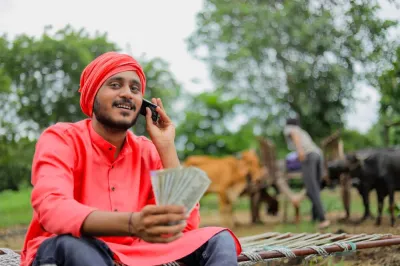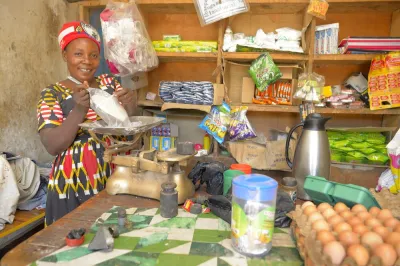FinDev COVID-19 Update | 30 Jul - 12 Aug 2020
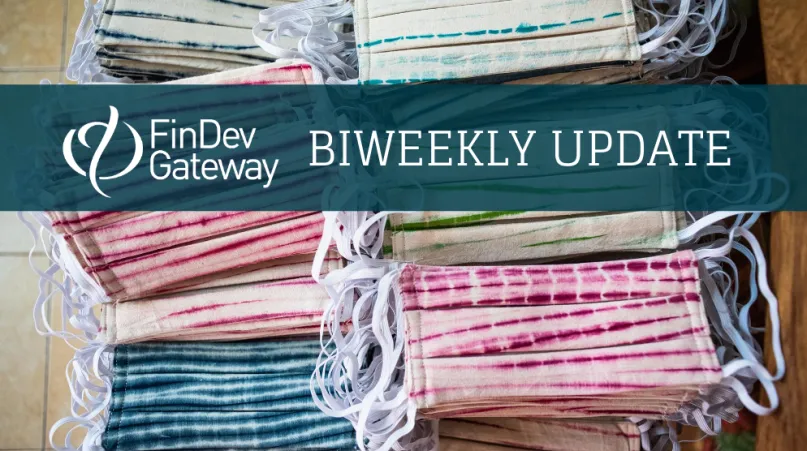
FinDev Gateway has created this COVID-19 Update with the latest and most relevant knowledge resources for financial inclusion as they become available. Sign up to receive this update to your inbox as soon as it comes out.
If you have content to share in our COVID-19 update, please submit here or contact us directly.
Do you find the update useful? How often would you like to receive it? Take a moment to let us know >>
Global
-
New results from the CGAP Global Pulse Survey of Microfinance Institutions shows four key ways in which MFIs are responding to COVID-19: 1) offering leniency to clients; 2) cutting back on their lending; 3) making flexible staff arrangements; and 4) scaling up remote channels.
-
A survey of small business owners and customers in seven high-income countries and Brazil found that 70 percent of consumers “have used a new shopping or payment method for the first time since the start of COVID-19”; nearly half of consumers would not shop at a store that doesn’t offer a contactless payment option.
- Government relief efforts in response to COVID-19 often exclude informal workers and women. A new CGAP COVID-19 Briefing offers insights on how to identify and reach informal workers in developing countries. Given that women face a higher risk of exclusion from government programs, a new paper suggests making women the default recipient of cash transfer programs and distributing mobile phones to women who don’t own one.
- According to a new CFI Brief, governments must consider that blanket moratoria for all institutions may not always be appropriate; based on early experience in Egypt, partial moratorium to MFI clients can be successful and ease the impact on the MFIs.
- As economies reopen, borrowers face a range of risks related to credit; among others, three possible risk scenarios include: 1) over-indebtedness among current borrowers; 2) inability of households and small businesses to obtain loans; 3) aggressive and reckless lending.
Asia
- About one-third of farm households in Punjab, Pakistan reported loss of earnings due to COVID-19 and 22 percent had family members return home from urban areas.
- Early-stage fintechs in Indonesia are cutting expenses by 30 to 60 percent to extend their life, according to a report by MSC which assesses the impact of the COVID-19 pandemic on Indonesian fintechs. Most early-stage fintechs surveyed had enough funds to survive only 3 to 6 months.
- SMEs in the region are receiving financial support through increased loan facilities. IFC provided $140 million in loans to two Vietnamese banks to support SMEs impacted by the pandemic. In Cambodia, Small and Medium Enterprise Bank (SME Bank) of Cambodia and Agricultural and Rural Development Bank of Cambodia have loaned out over $63 million so far to SMEs, as part of a $100 million emergency loan project financed by the SME Bank and 32 other financial service providers.
- According to a new ADB report, remittances to Asia and the Pacific are expected to decline by between $31 and $54 billion in 2020. With remittance-dependent households at risk of falling into poverty, ADB encourages countries to extend temporary protections for stranded and returned migrants as well as social protection for the poor, among other policy measures.
Africa
Some of the articles and knowledge resources referenced in this section are in French.
- According to IPA’s RECOVR survey, almost 70 percent of respondents in Sierra Leone reported that they were working fewer hours than before the pandemic; “about 90 percent, said they had not received economic assistance from the government since the pandemic began” and 60 percent had used up their savings to pay for food and other expenses.
- COVID-19 has exacerbated food insecurity for the most vulnerable people in the Sahel region of Africa. Given their large networks, financial institutions, especially MFIs and post offices, can play an important role in distribution of safety net payments.
- Airtel Africa and multinational bank Standard Chartered entered a partnership aimed at boosting financial services in Africa; users will be able to make online deposits and withdrawals and mobile banking transfers will be available across four key markets in the region.
For more on Africa, check out the latest Portail FinDev Weekly Update in French.
Latin America and the Caribbean
The articles and knowledge resources referenced in this section are in Spanish.
- Peru announced new rules for consumer protection requiring financial service providers to offer tailored loan repayment options and at least one credit card without membership fees.
- The Honduran Microfinance Network says that MFIs in the country have the capacity to lend up to $445 million, but 55 percent of MSMEs remain closed due to the COVID-19 lockdown.
- Despite the growth in digital payments during COVID-19, eight out of ten Argentines consider cash to be fundamental for their daily life and for reactivating the economy. 85 percent believe it is not possible to replace it with digital tools.
- Despite negative forecasts, remittances to Mexico increased 10.5 percent in the first six months of the year. Many Mexican immigrants in the U.S. availed of the country’s fiscal and unemployment relief packages upon losing their jobs, which may help explain the most recent growth in remittances. Inflows to El Salvador, Guatemala, Nicaragua and Honduras also grew in June.
- In Ecuador, eight out of ten workers are now either in the informal sector or unemployed.
For more on LAC, check out the latest Portal FinDev Weekly Update in Spanish.
Arab World
- The SANAD Fund for MSME has provided a $4 million loan to Vitas Palestine Microfinance Company. The investment will be used to expand financing for local micro and small enterprises and low-income households in an environment hit hard by COVID-19.
- The World Bank has extended a $300 million four-year program for two more years and increased its financing by $100 million to support the “Government of Jordan in providing Syrians with more flexible work permits to reduce informality and ensure they are covered under the labor law.” Jordan’s ambitious efforts to improve social security coverage led to an increased number of e-wallets from 0.62 million to 1 million in the last six months.
- Almost three in four consumers (72 percent) in the United Arab Emirates would avoid shopping at stores that don’t offer contactless payment options; 90 percent have made changes to the way they pay for items due to COVID-19, according to survey by Visa.
For more on the Arab world and resources in Arabic, check out the latest FinDev Weekly Update in Arabic.
COVID-19 Resources
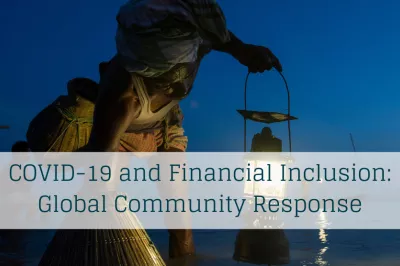
Global Community Response to COVID-19
A list of organizations offering resources and insights on COVID-19 & microfinance
FinDev Coronavirus Data Tracker
Data relevant for financial inclusion - find out who is tracking what
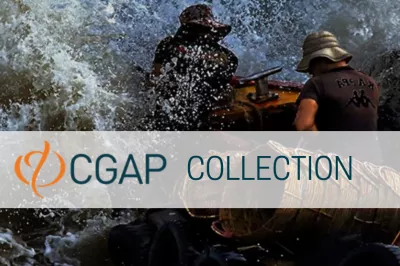
New Data Sources
View our complete Data Tracker listing most important sources and trackers by the level of their relevance to the sector.
ADB COVID-19 Policy Database
Asian Development Bank (ADB)
This database provides information on the key economic measures that authorities are taking to combat the COVID-19 pandemic. Measures are classified according to how they work their way through the financial system, and how they affect the financial positions of different sectors of society. The database also tracks non-economic measures.
Recent Publications
For a complete list of publications and to learn how you can share your research with us, visit FinDev's Publications page.
Digital Cash Transfers in Times of COVID-19
Bill & Melinda Gates Foundation, World Bank, CGAP, Women's World Banking | Aug 2020
Preserving Liquidity: Policymaker Responses to COVID-19 and the Impact on Low-Income Customers
Center for Financial Inclusion at Accion | Aug 2020
COVID-19 and Disruptions to Vulnerable Rural Livelihoods in the Sahel
CGAP | Aug 2020
Relief for Informal Workers: Falling Through the Cracks in COVID-19
CGAP | Aug 2020
COVID-19 Impact on International Migration, Remittances, and Recipient Households in Developing Asia
Asian Development Bank (ADB) | Aug 2020
Analysis of India’s Payment System Indicators in Quarter 2 2020
MicroSave Consulting (MSC) | Aug 2020
A COVID Perspective on Nepal Microfinance
M-CRIL | Aug 2020
Impact of COVID-19 on Fintechs: Indonesia Report
MicroSave Consulting (MSC) | Jul 2020
MFIs COVID-19 Opinion Survey Results
MicroRate | Jun 2020
Philippines: Impact of COVID-19 on Micro, Small, and Medium Enterprises
MicroSave Consulting (MSC) | Jun 2020
View All Publications Related to COVID-19 >
Blogs & Opinion
If you have a blog idea and would like to write for the FinDev Blog, please see our review our guidelines. We do not cross-post blogs that have been published elsewhere, but if you wish to share an existing blog post in our next FinDev Weekly Update, you can send it to us using our contact form.
Impact on the Inclusive Finance Sector
Four Ways Microfinance Institutions Are Responding to COVID-19
13 Aug 2020 | Peter Zetterli | CGAP
Survival, Recovery and Resilience: 12 Recommendations to Help Financial Institutions Weather the COVID-19 Crisis
11 Aug 2020 | Anup Singh & Graham Wright | NextBillion
4 Critical Steps for Fighting a Historic Remittance Decline in South Asia
07 Aug 2020 | Shahidul Haque & Sheikh Tanjeb Islam | World Economic Forum
A Sector in Ruins or ‘Building Back Better’? Findings From e-MFP’s COVID-19 Financial Inclusion Compass
06 Aug 2020 | Sam Mendelson | NextBillion
The Calm Before the Storm? The Impact of COVID-19 on Cooperative Financial Institutions
05 Aug 2020 | Juan Buchenau & Carlos E. Cuevas | World Bank
The Pandemic Crisis and Its Effects on Agriculture and Finance
02 Aug 2020 | Massimo Pera | Boulder Institute of Microfinance
Socioeconomic Impact
Financial Inclusion Helps Youth Mitigate COVID-19 Impact
12 Aug 2020 | Mohanad Salou & Diana Schvarztein | AFI
COVID-19 and the Hrishipara Diarists – July 2020: A Big Rebound – But Only for Some
10 Aug 2020 | Stuart Rutherford | The University of Manchester Global Development Institute
COVID-19: Risks for Borrowers as Economies Reopen
06 Aug 2020 | Elisabeth Rhyne | CGAP
Mitigating the Impacts of COVID-19 in a Fragile State: Key Findings from the RECOVR Sierra Leone Survey
31 Jul 2020 | John Branch, Shahana Hirji, Andreas Holzinger, Amara Kallon & Shana Warren | Innovations for Poverty Action (IPA)
A Pandemic Response Based on Listening: Leveraging Customer Interviews to Understand COVID-19’s Impact in the Developing World
29 July 2020 | Kat Harrison | NextBillion
Digital Financial Inclusion
Cash Transfers Through BRAC Bangladesh to Support Families During the COVID-19 Pandemic
08 Aug 2020 | Sahed Shams Azad | Boulder Institute of Microfinance
COVID-19 and Digitisation: Will Digitisation Drive Inclusion or Inequality?
06 Aug 2020 | Anzetse Were | FSD Kenya
Digital Identity and Financial Inclusion: How Digitizing Customer Due Diligence Can Strengthen Providers During COVID-19 and Beyond
05 Aug 2020 | Barry Cooper, Lezanne Janse Van Vuuren & Matthew Ferreira | NextBillion
How Can Digital Financial Services Help a World Coping With COVID-19?
03 Aug 2020 | Margaret Miller, Leora Klapper, Ghada Teima & Matthew Gamser | World Bank
News
For the latest news on the impact of coronavirus on financial inclusion, visit our News listing pages.
COVID-19 Driving Increase in Digital Payments in Singapore
| ATM Marketplace | Singapore
Digital Financial Services Must Expand to Address Pandemic Fallout
| The Daily Stay | Bangladesh
Asia-Pacific May See $31.4-54.3 BN Remittance Losses Due to COVID-19: ADB
| Yahoo News | East Asia and Pacific
View All News Related to COVID-19 >
Webinars & Recordings
For the latest events - hosted by organizations worldwide - exploring the impact of coronavirus on financial inclusion, visit our Events listing page.
A Look at Liquidity Measures: COVID-19 and Inclusive Finance Policy
02 Sep 2020 | Center for Financial Inclusion at Accion
How Is COVID-19 Impacting the Sustainability of Microfinance Institutions?
05 Aug 2020 | CGAP | Webinar Recording
Quick Links:
FinDev Guide
About this guide
Published
Topics
Contributed by a global financial inclusion community member. Share your lessons learned
Write for usLeave a Comment
Comments on this page are moderated by FinDev Editors. We welcome comments that offer remarks and insights that are relevant to the post. Learn More
